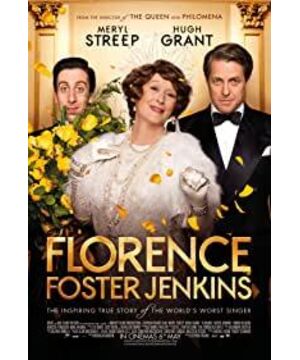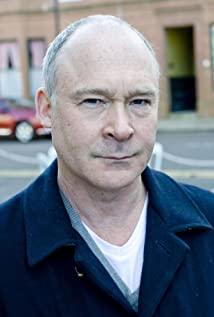Information from Carnegie Hall: "Not only is it the main cultural focus of New York, the capital of the world, but also the world's most prestigious, most challenging, and most prestigious cultural performance stage."
An out-of-tune fancier not only appeared on the professional-level stage, but also received a lot of attention from the audience. The singer refuted the famous saying of media criticism: "They can say that I can't sing, but they can't say that I don't sing." She doesn't care about the strange vision of people, and she keeps releasing albums, which has solidly brushed her sense of existence, so that her wonderful deeds have been adapted into stage plays and movies in various countries for decades.
The film has a strong cast, played by Meryl Streep as a tone-deaf Jenkins, rich and generous, surrounded by a group of old friends who are close friends, and she sings out-of-tune songs for them , they applauded and cheered for her singing, their well-meaning deceit made her confident, what they heard was not her stomach cramp-like singing, but what they saw was her hard work and persistence. White lies are more sincere than ugly honesty.
Hugh Grant plays Jenkins' husband. As the driving force behind Jenkins' singing career, he maintains his wife's dreams and dignity. By buying and selecting audiences, Jenkins' concert is guaranteed to be a success. When he learns that the media does not buy it In the case of giving a bad review, I bought two blocks of newspapers, so that Jenkins would not see the bad review report, she was his wife, and he was her bosom friend.
Simon Helberg as Howard in The Big Bang Theory, the pianist who plays Jenkins, a pianist who is exhausted by "The King's New Clothes", but he still doesn't look like "The King's New Clothes" The middle-aged child pierces the blatant lies like that. People like to live in white lies. Lies not only bring dreams to Jenkins, but also bring comfort and hope to the people around them. The pianist wants to The dream of playing in Carnegie Hall was finally realized with Jenkins in a lie.
The love in the film is a side dish, and the comedy effect is mediocre. Only when Jenkins' stern out-of-tune is compared with the pianist's grinning, the exaggerated expressions and actions of these two people are really too hilarious. After laughing, there is still a little inspirational mood, which makes people happy and moved.
The chicken soup in the film is quite heavy. Compared with the talented group of people, if people who have no talent at all want to realize their dreams, they can only persevere with painstaking effort and win the attention of the world with a naivety. Even if it is ridiculed, because behind every person being ridiculed is a group of cheapskates who make cynicism about the world.
At the same time, the film also captures the general tendency of American society: if you want to gain both fame and fortune on American soil, you must either take responsibility for your strength or be shameless.
The real Jenkins is really as confident as in the movie, does she really know nothing about her out-of-tune? Jenkins made a living by teaching the piano in her early years. Does she really understand rhythm? Will Jenkins, who shamelessly released 8 albums in a row, be "unprecedented" in the same way that Duchamp put urinals in the exhibition hall, and if others follow her after her, it will become worthless?
The art world in 1917 could have such a bold act, why couldn't the music world in 1944? It's hard to tell if these actions weren't Jenkins' intentional history of fame? In any case, she succeeded, remembering the untalented out-of-tune diva.
View more about Florence Foster Jenkins reviews











